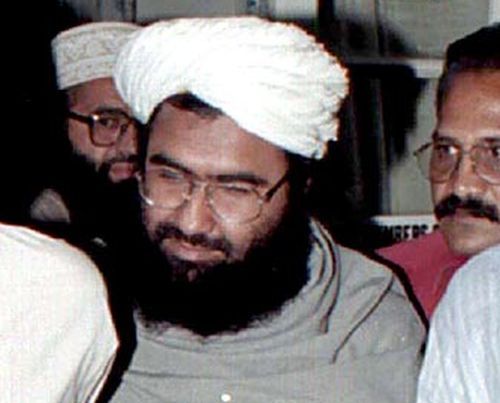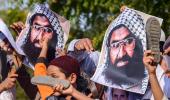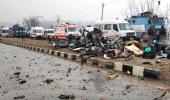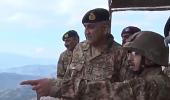'Whichever way you look at it, it is a blow to the JeM and to the Pakistani army in general; the attack has taken place in mainland Pakistan and not in PoK.'
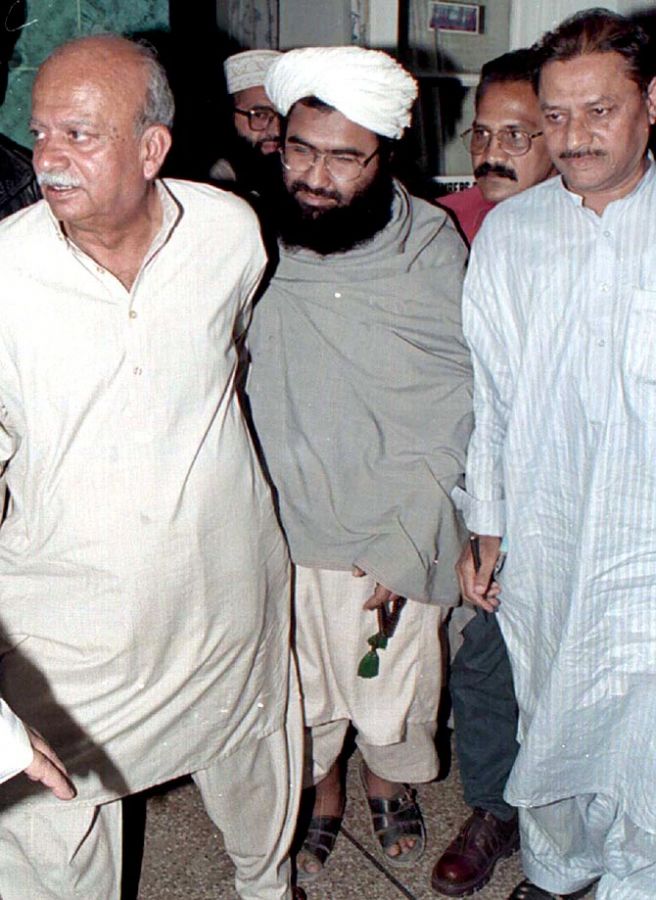
Under the overlying picture of the escalating tensions between India and Pakistan is a complicated skein of complex issues.
Happymon Jacob, associate professor of diplomacy and disarmament studies at the School of International Studies, Jawaharlal Nehru University, takes a look at some of them.
Dr Jacob has spent the last two years researching ceasefire violations on both sides of the Line Of Control. For the last decade-and-a-half, he has been travelling regularly to Pakistan, where he has spent time with the Pakistani army.
His recently released books -- The Line Of Control: Travelling With The Indian And Pakistani Armies and Line On Fire: Ceasefire Violations And India-Pakistan Escalation Dynamics -- are a fascinating distillation of his experiences.
An expert on the Kashmir conflict and India-Pakistan relations, Dr Jacob tells Savera R Someshwar/Rediff.com why the Jaish-e-Mohammed might bounce back with more vigour, why China's response to the recent India-Pakistan escalation has been muted and why India will not succeed in isolating Pakistan internationally.
- Part 1 of the interview: 'India has crossed a red line, that's how Pakistan sees it'
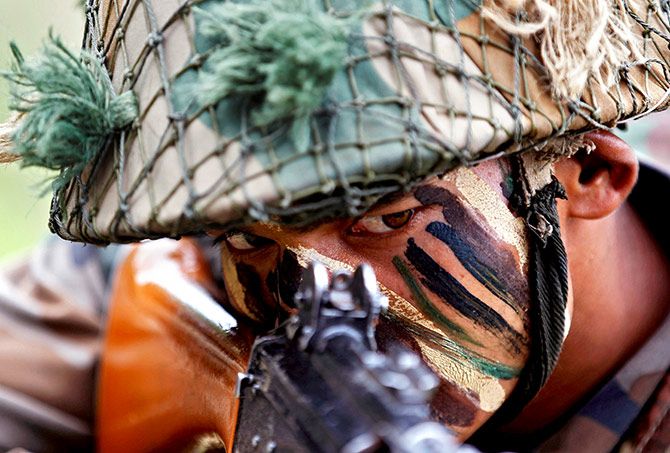
You've been on both sides of the border. You've travelled with the Pakistani army, and you've written about this in your recently released book, The Line Of Control: Travelling With The Indian And Pakistani Armies. Can you tell us what the Pakistani army is like and what their state of mind might have been after India's strike?
I have been going to Pakistan for almost one-and-a-half decades now and I know many Pakistani generals.
I have been researching on Pakistan for more than one-and-a-half decades and my impressions, based on that, is that the Pakistani army is a very well-trained, sharp, strategically minded army.
Their navy and air force are also equally good.
It is a very India-obsessed military. It is a battle-hardened military. It is a professionally trained army. They have been educated in various military academies around the world.
So you are looking at a first-rate army.
More importantly, unlike the Indian army, the Pakistani army manages the affairs of the Pakistani State. They are far more trained in the art of statecraft as it were.
They would, of course, want to up the ante. Their blood would be boiling at this point. But they are also a strategically shrewd and a smart animal.
So, yes, I think there would a lot of heartburn among the men I saw across the Line of Control on the Pakistani side.
There's no question about that.
After the Pulwama attack, there have been loud calls for retaliation as well as calls for restraint. Do you believe India's response was the correct one?
Let's put it this way.
I think there was no doubt the Pakistanis had to do more in terms of reining in the terrorism emanating from their soil, be it the LeT or be it the Jaish e Mohammed; they haven't done enough.
And so India had to take some action.
can you share what you have heard about what the terrorist training camps at Balakot, Muzaffarabad and Chakoti?
Much of the training camps are far away from the Line of Control or may not even be inside the PoK.
For example, the current attack was against Balakot in the Khyber Pakhtunkhwa province, which is not even in PoK.
The training camps are elsewhere, the launching pads are across the Line of Control and they are temporary, makeshift arrangements. They stay there for a day or two before they are launched across the Line of Control by the Pakistani side.
Of course, I don't have any access to these places and the Pakistani side would refuse to accept any argument about this having been done by their side.
It is not easy to attack a launch pad because you don't know where the launch pad is. They are temporary, they are makeshift; they move on.
But training camps are mostly permanent, which is what they have targeted, a Jaish-e-Mohammed training camp in the Khyber Pakhtunkhwa province.
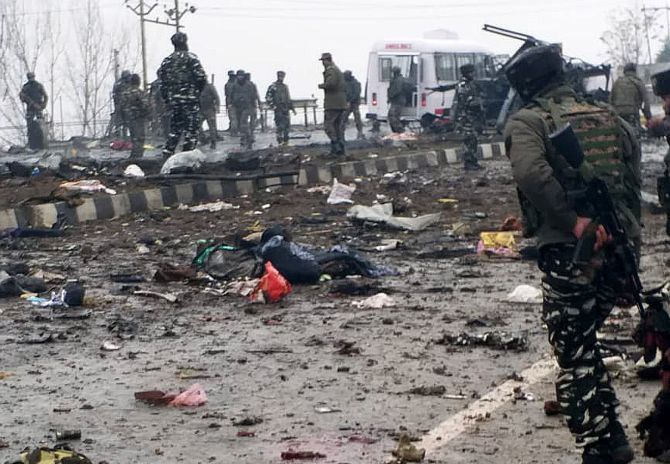
How big a blow do you think India's retaliation was for the Jaish?
Oh I think it is likely to be... going by the reports, going by the briefing of the foreign secretary yesterday (this interview was conducted on Wednesday night) , it seems to be a major attack.
The camp was said to be run by Yousuf Azhar, who is the brother-in-law of Jaish-e-Mohammed chief Masood Azhar.
The Indian side has gone on to claim that over 300 terrorists have been killed in the attack.
If these claims are accurate -- I have no way of verifying their accuracy -- this is a major blow to the Jaish and it is also a major blow to the Pakistani army. And if they don't respond, this will also be a blow to their morale.
The international community does not stand by them. The international community, with respect to this strike, will only stand by India.
Whichever way you look at it, it is a blow to the JeM, to the army and to the Pakistani army in general; the attack has taken place in mainland Pakistan and not in PoK.
But let's put it this way. It is not difficult for a terrorist organisation to recoup, to reorganise itself, to recruit more people and to bounce back with more vigour.
So I wouldn't call it as a long term defeat. If they desire to come back, they will come back. They have the wherewithal to do that.
What can now be done to defuse the situation?
Three things:
No 1, the back channel negotiations will have to be initiated now, away from the media glare.
No 2, the fact that Pakistan has limited its strikes to within Jammu and Kashmir indicates they do not want to escalate further at least at this point of time.
Thirdly, Pakistan needs to act against the terror elements within its borders. That will indicate to India that Pakistan is serious about Imran Khan's offer for dialogue.
To what extent are international reactions to such a retaliation factored in when such an operation/response is being planned?
The most important reaction that India would have expected was from the United States.
Soon after the Pulwama attack, there were statements coming from the United States that India has the right to self-defence. Trump said something very serious is going to happen. This showed that the Americans probably knew what was going to happen.
They were probably kept informed about the impending strike against the Pakistanis.
It is also probable that the Americans shared intelligence with the Indian side.
The Chinese are probably not going to get into the picture at this point in time.
The rest of the international community is just watching and seeing where it is going.
So far, there is no adverse reaction at least to India from the international community.
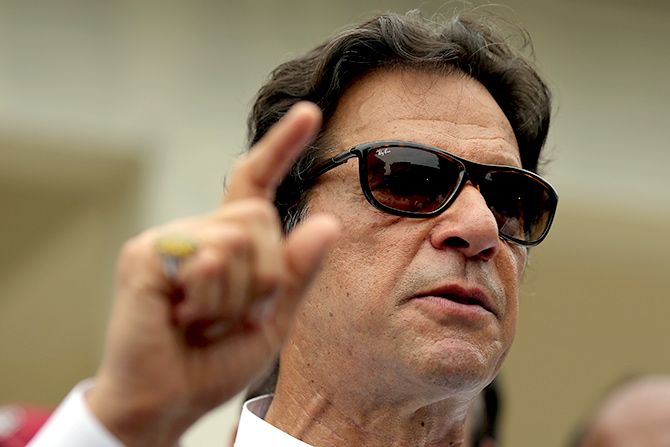
Sushma Swaraj was in China for a trilateral meet that included Russia. Were you surprised by China's measured response to the air strikes?
India has made a smart move by timing the strike just before the meeting with the Chinese side.
Even if the Chinese considered issuing a strong statement condemning the Indian strike, they may not necessarily do so because there is a meeting between the two sides.
I think it is smartly played by India.
Since the external affairs minister was in China, India would be able to gauge the temperature in Beijing and will try and reason with the Chinese.
Do you think India can do anything to influence China to get Pakistan to curb the terrorism that is emanating from its soil?
No, that is very difficult because Pakistan is, as the Pakistanis would put it, one of the best allies and best friends of China at this point.
China has every reason to keep Pakistan in its corner in the emerging geopolitical game in the Asian region.
Afghanistan is turning the Pakistani way.
The Russians and Chinese are close to the Pakistanis.
The China-Pakistan Economic Corridor is a major investment for the two countries.
There is no reason for China to upset the Pakistanis and whatever India might do, Indians will not be able to wean China from Pakistan.
That is just not going to happen.
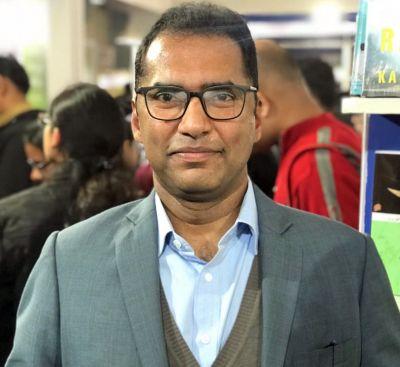
India's effort has always been to isolate Pakistan internationally as a State sponsor of terrorism. How practical and feasible is this and will this approach help?
I don't think that India's attempt to isolate Pakistan has succeeded.
The reality is that the Russians need the Pakistanis, the Chinese need the Pakistanis, the Americans will want their day with the Pakistanis now that they are negotiating with the Taliban in Afghanistan.
So the international community is not really going to turn the heat on Pakistan.
India will have to do what it has to do and it has done that through military reach.
Their attempts to isolate Pakistan diplomatically have not succeeded at all.
Pakistan is economically a weak State. Would not targeting its economic stability be a stronger and more permanent response?
Targeting Pakistan economically is easier said than done.
Directly, there is only so much India can do because the trade is under a few million dollars so that is not going to hurt Pakistan.
But, clearly, the financial actions of the United Nations against Pakistan to some extent are the handiwork of the diplomatic community putting pressure on the Americans.
There is some of international economic pressure that India has put on Pakistan.
But directly, on its own, there is only so much India can do to turn on the screws economically on Pakistan.
